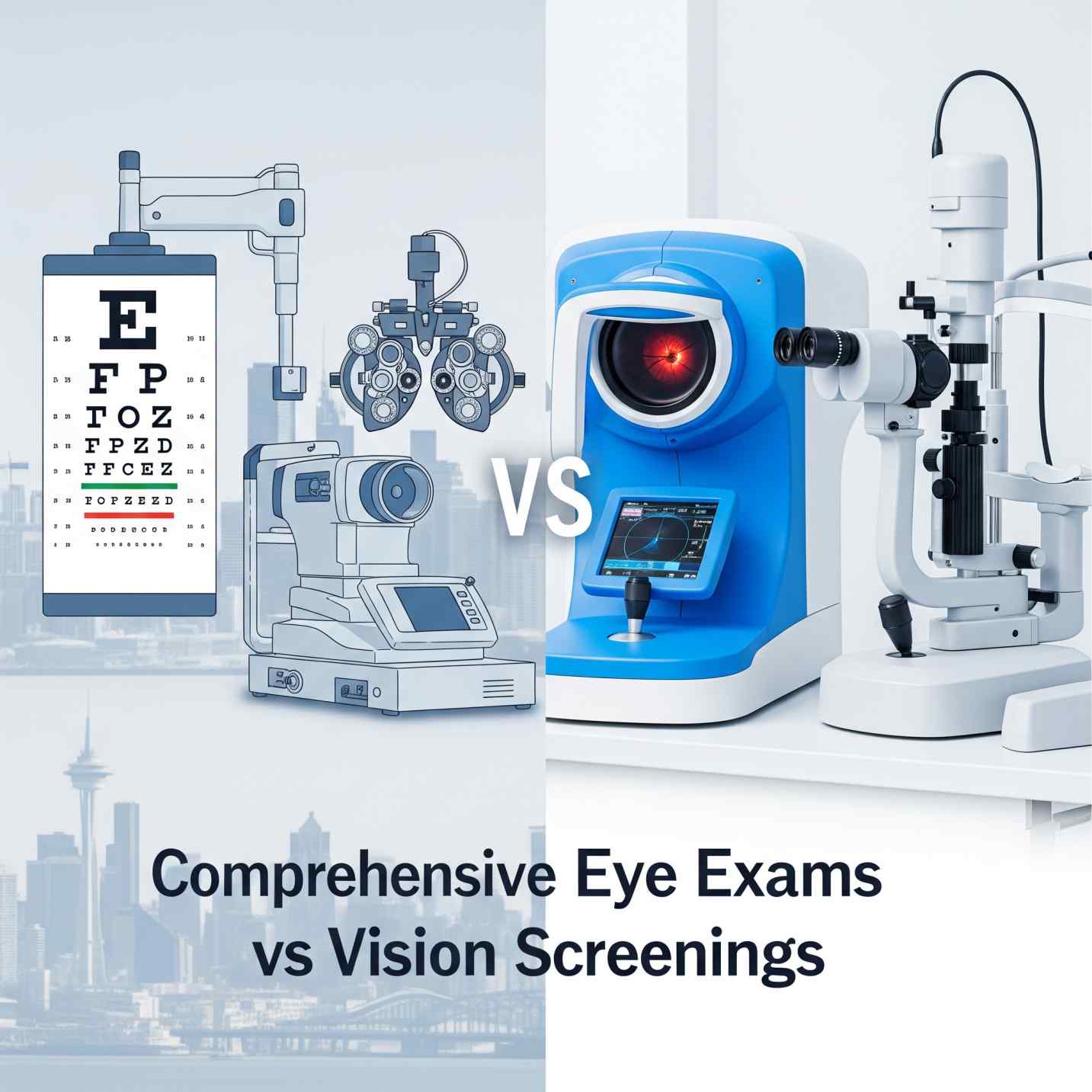Can I Wear Contacts? Seattle Optometrists Explain
Considering contact lenses in Seattle? Discover candidacy, safety tips, and modern solutions for astigmatism and presbyopia at Cannon EyeCare.
Key Takeaways from Seattle’s Contact Lens Guide by Cannon EyeCare
-
Most people can wear contact lenses – including kids, those with astigmatism or presbyopia, and active Seattleites needing vision flexibility in rain or sports.
-
Safety starts with proper fit, hygiene, and follow-up – never sleep in non-approved lenses and always replace them as scheduled to avoid complications.
-
Modern lens options cover a wide range of needs, from daily multifocals for screen-heavy days to custom toric lenses correcting severe astigmatism.
-
Kids benefit from contacts too, especially for sports and self-confidence; readiness depends on maturity, not just age.
-
Expert training matters – Cannon EyeCare’s doctors, not technicians, guide every patient through insertion, removal, and ongoing lens success.
-
Local expertise gives you an edge – Seattle-based fittings consider the region’s lifestyle, weather, and unique vision demands.
Your Top Contact Lens Questions Answered by Seattle Eye Experts
1. Are contact lenses safe?
Yes, when prescribed and cared for properly. Seattle eye doctors emphasize:
-
Follow hygiene practices (wash hands before handling lenses).
-
Replace lenses as directed (daily, bi-weekly, or monthly).
-
Attend annual Seattle eye exams to update prescriptions.
2. Am I a candidate for contact lenses?
Most patients in Seattle can wear contacts! Factors include:
-
Eye health (e.g., dry eye management in WA’s climate).
-
Lifestyle (ideal for active Seattleites hiking or biking).
-
Prescription type (astigmatism, bifocals, etc.).
3. Can you sleep in contact lenses?
Only if prescribed for overnight use. Sleeping in non-approved lenses raises infection risks. Ask your Seattle optometrist about FDA-approved extended-wear options.
4. Can people with astigmatism wear contacts?
Absolutely! Modern toric lenses correct astigmatism. Seattle clinics offer tailored fittings for irregular corneas.
5. How do I learn to put contacts in?
Our Seattle team provides:
-
Step-by-step tutorials during fittings.
-
Tools like suction applicators for beginners.
-
Follow-up support to ensure comfort.
6. Can bifocal patients wear contacts?
Yes! Options include:
-
Monovision (one eye corrected for distance, one for near).
Schedule a Seattle contact lens consultation to explore solutions.
7. Can a contact lens get stuck behind your eye?
No—anatomy prevents this. If a lens shifts, rinse your eye or visit a Seattle eye care provider for safe removal.
In this blog post, I will attempt to address the most common contact lens questions.
Best Candidates for Contact Lenses in Seattle, WA
Ideal for patients who:
-
Wear glasses daily but desire flexibility.
-
Participate in Seattle sports (e.g., hiking, kayaking) or need clear vision in rainy weather.
-
Seek alternatives for social events (weddings, theater nights).
• Not recommended for those with minimal prescription needs, unless lifestyle demands outweigh maintenance.
Advances in Astigmatism Correction
• Toric Lenses: Correct up to 2.5 diopters of astigmatism.
• Custom Solutions: Seattle optometrist Dr. Mark Cannon at Cannon EyeCare successfully fits lenses for 5 diopters—achieving near-20/20 vision.
Safety Practices from Seattle’s Trusted Optometrists
-
Keep updated glasses for evening wear (let eyes “breathe”).
-
Replace lenses on schedule to avoid CLOW (Contact Lens Over Wear).
• Never: Sleep in contacts—increases infection risks.
• Schedule annual exams at Cannon EyeCare in Seattle, WA, for personalized guidance.
Multifocal Contacts: Seattle’s Latest Option
Eliminate reading glasses with:
-
Daily disposable multifocals: Ideal for active lifestyles.
-
Custom designs for tasks like screen work or exploring Pike Place Market.
Pediatric Contact Lenses: Safe for Kids?
1. Safety & Age Recommendations
-
Safety first: Modern contacts are safe for kids when properly fitted and supervised.
-
Typical age: Most optometrists recommend starting at age 10-12, depending on maturity and hygiene habits.
-
Seattle-specific note: At Cannon EyeCare, Dr. Mark Cannon assesses each child’s readiness through a trial period with daily disposables to minimize infection risks.
2. Benefits of Contacts for Kids
-
Sports & activities: Ideal for Seattle’s soccer, swimming, or rainy-day play (no fogged glasses!).
-
Self-esteem boost: Many kids prefer contacts for school or social events.
-
Myopia control: Specialized lenses (e.g., MiSight®) can slow childhood nearsightedness progression.
3. Parent & Child Readiness Checklist
Ask yourself:
-
Does my child handle routines well (e.g., brushing teeth)?
-
Can they avoid rubbing their eyes?
-
Are they motivated to wear contacts (not just parent-pressured)?
4. Why Choose a Seattle Provider?
-
Custom fittings: Cannon EyeCare uses kid-friendly tools to measure small corneas accurately.
-
Training: Doctors (not technicians) teach insertion/removal with patience—no extra fees for repeat sessions.
-
Emergency support: Same-day help for lost lenses or irritation, critical for busy Seattle families.
Contact lenses offer freedom, comfort, and clear vision for a wide range of lifestyles—from active Seattle adventurers to kids needing a confidence boost. With the right fit, expert guidance, and ongoing care, almost anyone can wear contacts safely and successfully.
-
How much do contact lenses cost in Seattle?
Contact lens costs vary by type (daily, bi-weekly, monthly) and prescription. At Cannon EyeCare, prices start at $25/month, including exams. Insurance often covers part of the cost—check your plan or ask about our flexible spending account (FSA) options.
-
Can I wear contacts if I have dry eyes in Seattle’s climate?
-
Are there contact lenses for allergy sufferers?
-
What’s the best contact lens for hiking or kayaking in Seattle?
-
Can I swim with contact lenses in Seattle lakes or pools?
-
Do you offer colored contact lenses in Seattle?
-
How do I handle contacts during Seattle’s rainy weather?
-
How often should I replace my contact lens case?
-
Are eco-friendly contact lenses available?
-
How do I know if my contact lens prescription needs updating?
-
Can I alternate between glasses and contacts?
-
What if I lose a contact lens suddenly?


